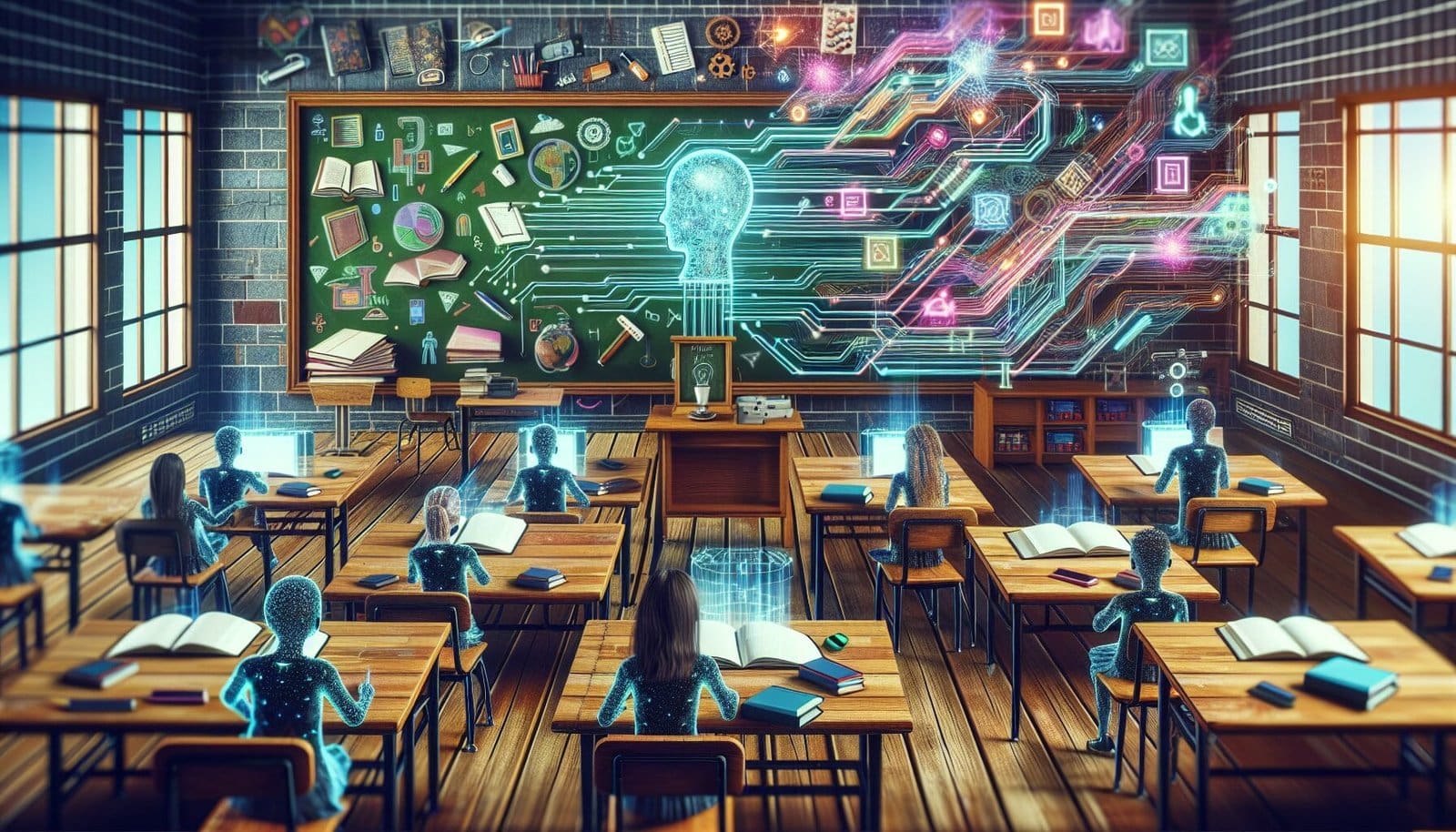Artificial intelligence applications are revolutionizing the education sector, transforming the way we learn and opening up endless possibilities for students and educators alike. From personalized learning experiences to intelligent tutoring systems, AI is paving the way for a more efficient and effective educational journey. In this article, we explore the various ways in which AI is reshaping education, improving engagement, and enhancing the overall learning process. With AI by our side, education is entering a new era of innovation and advancement.
Understanding Artificial Intelligence
Artificial Intelligence (AI) is a field of computer science that focuses on creating intelligent machines capable of performing tasks that would usually require human intelligence. These tasks include learning, problem-solving, and decision-making. AI technology has made significant advancements in recent years, and its applications are now being explored in various industries, including education.
Definition of Artificial Intelligence
Artificial Intelligence is the branch of computer science that deals with the creation and development of intelligent machines capable of mimicking and performing tasks that would typically require human intelligence. These tasks can include learning, problem-solving, decision-making, and even human-like interactions. AI systems can process large amounts of data, recognize patterns, and make predictions or recommendations based on the information provided, all without direct human intervention.

Benefits of Artificial Intelligence in Education
Artificial Intelligence has the potential to revolutionize education by offering numerous benefits for students, teachers, and educational institutions. Some of the key benefits of AI in education include:
-
Personalized Learning: AI-powered systems can provide personalized learning experiences tailored to the individual needs and abilities of each student. By analyzing data such as learning styles, preferences, and strengths and weaknesses, AI algorithms can adapt instructional content and delivery methods, ensuring that students receive targeted and effective instruction.
-
Adaptive Assessment and Feedback: AI can provide real-time assessment and feedback to students, allowing them to gauge their understanding of the material and make improvements accordingly. Adaptive assessments can adjust the difficulty level of questions based on the student's performance, ensuring a more accurate assessment of skills and knowledge.
-
Virtual Reality and Augmented Reality in Education: AI technologies such as virtual reality (VR) and augmented reality (AR) have the potential to transform the learning environment by providing immersive and interactive experiences. VR and AR simulations can allow students to explore complex concepts, visit virtual museums, or conduct virtual experiments, enhancing their understanding and engagement.
-
Intelligent Tutoring Systems: AI-powered intelligent tutoring systems can act as virtual tutors, providing real-time guidance and support to students. These systems can offer explanations, answer questions, and provide step-by-step solutions to problems, fostering independent learning and reducing the dependency on human instructors.
-
Smart Content and Curriculum Development: AI algorithms can analyze vast amounts of data to identify patterns and trends in student learning. This analysis can help educators design curriculum and develop content that is aligned with student needs and preferences, ensuring a more engaging and effective learning experience.
How Artificial Intelligence is Transforming Education
Artificial Intelligence is transforming the education landscape by introducing new methods and technologies that enhance teaching and learning practices. Here are some significant ways in which AI is revolutionizing education:
Personalized Learning
AI algorithms can analyze a student's learning patterns, preferences, and strengths and weaknesses to provide personalized learning experiences. These algorithms can adapt the instructional content and delivery methods based on individual needs, ensuring that students receive targeted and effective instruction.
Adaptive Assessment and Feedback
AI-powered assessment systems can provide real-time assessment and feedback to students. These systems utilize adaptive algorithms to adjust the difficulty level of questions based on the student's performance. This ensures a more accurate assessment of skills and knowledge and provides immediate feedback for improvement.
Virtual Reality and Augmented Reality in Education
AI technologies such as virtual reality (VR) and augmented reality (AR) have been increasingly used in education to create immersive learning experiences. VR and AR simulations can allow students to explore complex concepts, visit virtual museums, or conduct virtual experiments, enhancing their understanding and engagement.
Intelligent Tutoring Systems
AI-powered intelligent tutoring systems act as virtual tutors, providing real-time guidance and support to students. These systems can offer explanations, answer questions, and offer step-by-step solutions to problems, fostering independent learning and reducing the dependency on human instructors.
Smart Content and Curriculum Development
AI algorithms can analyze large amounts of data to identify patterns and trends in student learning. This analysis can help educators design curriculum and develop content that is aligned with student needs and preferences, ensuring a more engaging and effective learning experience.

Challenges and Concerns
While the potential benefits of AI in education are significant, it is important to consider the challenges and concerns associated with its implementation. These challenges include:
Privacy and Data Security
Implementing AI systems in education requires the collection and analysis of a significant amount of student data. This raises concerns about the privacy and security of sensitive information. It is crucial for educational institutions and AI developers to prioritize data protection measures and ensure compliance with relevant data privacy regulations.
Ethical Considerations
AI algorithms and systems are developed and trained based on existing data, which can introduce biases and reinforce existing inequalities. Educators and AI developers must address ethical considerations to ensure that AI technologies in education promote fairness, inclusivity, and equality.
Equity and Accessibility
Implementing AI technologies in education can potentially exacerbate existing inequalities in access to education. Not all students and schools may have equal access to AI-powered tools and resources. It is essential to address these equity concerns and ensure that AI is used as a means to bridge the digital divide rather than widen it.
Successful Applications of AI in Education
AI has already made significant strides in education, with successful applications across various aspects of the learning process. Some notable examples include:
Chatbots for Student Support
AI-powered chatbots provide round-the-clock support to students, answering frequently asked questions, providing guidance, and addressing concerns. These chatbots can help students navigate administrative processes, find resources, or clarify doubts, enhancing student support services.
Automated Grading Systems
AI-based grading systems can automate the grading process, reducing the time and effort required by teachers. These systems analyze student responses and provide instant and accurate feedback, saving teachers valuable time and allowing them to focus on other aspects of instruction.
Data Analytics for Performance Tracking
AI algorithms can analyze large amounts of data to track student performance and identify areas of improvement. These analytics provide valuable insights to both teachers and students, enabling targeted interventions and personalized learning experiences.
Language Processing for Language Learning
AI technologies, such as natural language processing, can assist language learners by providing real-time feedback on pronunciation, grammar, and vocabulary usage. These AI-powered language learning tools can enhance language acquisition and support independent practice.
Simulations and Gamification in Learning
AI-powered simulations and gamification techniques can create interactive and immersive learning experiences. These experiences can engage students, promote active learning, and enhance understanding and retention of complex concepts.
Current Use of AI in Schools
AI is currently being used in schools worldwide to enhance various aspects of education. Some examples of the current use of AI in schools include the following:
AI-Powered Learning Management Systems
Learning management systems (LMS) enhanced with AI capabilities can track student progress, recommend personalized learning resources, and provide data-driven insights to teachers. These systems streamline administrative tasks, support personalized learning, and improve communication between teachers, students, and parents.
AI for Student Engagement
AI technologies can be used to enhance student engagement by analyzing data on student behavior and preferences. This analysis can help identify personalized recommendations for engaging content, activities, or interventions, fostering student motivation and participation.
AI-Assisted Lesson Planning
AI can assist teachers in lesson planning by analyzing student performance and identifying areas that need reinforcement or further instruction. AI-powered tools can recommend pedagogical strategies, resources, and curricular adaptations to enhance the effectiveness of lesson planning.
Future Possibilities
The potential of AI in education is vast, and several exciting possibilities are emerging. Here are some future possibilities of AI in education:
Personal AI Assistants for Teachers
AI-powered virtual assistants can support teachers in various instructional tasks, such as generating assessments, providing feedback, or creating personalized learning plans. These AI assistants can help reduce administrative burden and support teachers in delivering high-quality instruction.
Virtual and Augmented Reality for Immersive Learning
The use of virtual reality (VR) and augmented reality (AR) in education is poised to grow significantly. VR and AR technologies can provide immersive and interactive learning experiences, allowing students to explore historical sites, conduct virtual experiments, or engage in simulations that enhance their understanding and engagement with the material.
AI-Based Early Warning Systems
AI algorithms can analyze patterns in student performance and behavior to identify early warning signs of academic or emotional challenges. These AI-based early warning systems can alert educators and support staff to provide timely interventions and support, reducing the risk of students falling behind academically or experiencing distress.
Benefits of AI in Education
The integration of AI in education offers numerous benefits for students, teachers, and educational institutions. Some key benefits include:
Improved Learning Outcomes
Personalized learning experiences provided by AI algorithms can enhance student understanding and engagement, leading to improved learning outcomes. AI-powered assessment and feedback systems can also contribute to more accurate evaluation of student skills and knowledge.
Enhanced Teaching and Support
AI can provide teachers with valuable insights into student performance and learning patterns, enabling targeted interventions and personalized instruction. AI-powered support systems, such as chatbots, can help lighten the workload for teachers and provide round-the-clock support to students.
Greater Efficiency and Productivity
The automation of administrative tasks, such as grading or data analysis, can save teachers significant time and effort, allowing them to focus on instructional activities. AI-powered systems can streamline processes, improve resource allocation, and enhance overall efficiency in educational institutions.
Ethical Considerations in AI Education
As AI technologies become more prevalent in education, it is crucial to address ethical considerations to ensure that their implementation promotes fairness, equity, and inclusivity. Some of the ethical considerations in AI education include:
Bias in AI Algorithms
AI algorithms are developed based on existing data, which can introduce biases and reinforce existing inequalities. Educators and AI developers must actively mitigate bias by ensuring diverse data sources and thorough testing of algorithms for fairness.
Privacy and Data Security
The implementation of AI technologies in education involves the collection and analysis of sensitive student data. It is vital to protect student privacy and ensure compliance with data security regulations. Educational institutions and AI developers must prioritize data protection measures and provide transparency to students and parents about the use of their data.
Taking Human Factors into Account
AI technologies should not replace human interaction and connection in education. While AI can provide valuable support and assistance, it is essential to strike a balance between technology and human involvement. Taking human factors into account when implementing AI in education ensures that the focus remains on student well-being, holistic development, and social-emotional learning.
Preparing Educators and Students for AI
As AI becomes more prevalent in education, it is essential to ensure that educators and students are adequately prepared to harness its potential. Some steps to prepare educators and students for AI integration include:
Teacher Training on AI Integration
Providing professional development opportunities for educators to learn about AI integration in education is crucial. Teachers need to understand how to effectively use AI technologies, interpret data insights, and adapt instruction accordingly. Training programs can help teachers develop the necessary skills and knowledge to incorporate AI into their teaching practices.
Developing Digital Literacy Skills
Digital literacy skills are essential for navigating the AI-powered educational landscape. Educators must focus on developing students' critical thinking, information literacy, and digital citizenship skills. These skills enable students to assess the credibility of AI-generated content, understand the ethical implications of AI technologies, and engage responsibly in the digital world.
Promoting Critical Thinking and Ethical Use
Educators play a vital role in promoting critical thinking and ethical use of AI technologies. By fostering discussions around ethical considerations, biases, and privacy concerns associated with AI, teachers can help students develop a sophisticated understanding of AI and make informed decisions about its use.
Conclusion
Artificial Intelligence is transforming education by providing personalized learning experiences, adaptive assessments, and intelligent tutoring systems. The successful applications of AI in education include chatbots for student support, automated grading systems, data analytics for performance tracking, language processing for language learning, and simulations and gamification in learning. AI is currently being used in schools for student engagement, AI-powered learning management systems, and AI-assisted lesson planning. While AI offers several benefits for education, ethical considerations and the preparation of educators and students are crucial. By addressing bias in AI algorithms, prioritizing privacy and data security, and promoting critical thinking, educators can ensure that AI integration in education is fair, equitable, and ethical. Preparing educators and students for AI involves teacher training on AI integration, developing digital literacy skills, and promoting critical thinking and ethical use. As AI continues to advance, it holds immense potential to enhance learning outcomes, support teachers, and improve efficiency in education. Embracing the benefits of AI while addressing the associated challenges is key to transforming education for the better.








